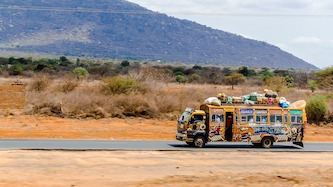Living costs in Sub-Saharan Africa are going up because the money in the region is not very strong. This means that things like food, transportation, and stuff we buy are getting more expensive. In Nigeria, for example, the price of frozen chicken has gone up by more than 26% in the last three months. Because of this, people are buying less stuff, and businesses are having a hard time selling their things. The money in countries like Nigeria and Angola is getting weaker because they don’t have enough foreign money and they rely too much on things they buy from other countries.
When there’s not enough foreign money, the exchange rate goes up, and that makes it more expensive for businesses to buy things from other countries. Then, they have to charge more money for the things they sell to us. Sometimes, businesses can’t even get their money in foreign money from the bank, so they have to stop working. This is bad for the economy and can make it harder for other countries to invest in these places. Even though countries like Nigeria and Angola sell oil in US dollars, they still have a lot of debt and have to pay for things like fuel and energy, which uses up their foreign money.
The governments in these countries are trying to fix this problem. For example, Nigeria’s central bank wants to put $10 billion worth of foreign money into the market to pay off debts. They also lifted bans on certain things they import to reduce the need for foreign money. Ghana is using gold instead of money to buy oil and save their foreign money. Egypt is making deals where they trade things instead of using US dollars. These things are supposed to make the local money stronger and make the countries less dependent on foreign money.
To make the local money stronger, African countries need to trade more with each other and buy things made in Africa. They’re trying to do this with something called the Continental Free Trade Agreement. But there are problems like bad roads and not enough ways to connect with other countries that make it hard to trade. Africa needs to be better at making things and being competitive so they can trade with other countries like everyone else does. They also need to have better roads and stuff to make it easier to trade within the continent.
This problem with weak money is affecting businesses like Arinola Omolayo’s frozen food store in Lagos. Because things are so expensive, people are buying less, and businesses are having a hard time making money. To fix this, African countries need to focus on trading with each other and making their money stronger by being better at making things and being competitive.
Original news source: Weak currencies force up cost of living in Sub-Saharan Africa (BBC)
Listen
Slow
Normal
Fast
Group or Classroom Activities
Warm-up Activities:
– News Summary
Instructions: Students will work in pairs to summarize the article in their own words, aiming to capture the main points in just two or three sentences. After they’ve written their summaries, each pair will share theirs with another pair to discuss any details that might have been interpreted differently or omitted.
– Opinion Poll
Instructions: Create a list of statements based on the article’s content, such as “Foreign investment is crucial for Sub-Saharan Africa’s economic growth.” Students will walk around the room and poll their classmates, marking down whether they agree or disagree with each statement. After polling, students will gather and discuss the reasons behind their opinions to better understand different perspectives.
– Word Association
Instructions: Write key terms from the article (e.g., “foreign money,” “exchange rate,” “debt,” “Continental Free Trade Agreement”) on the board. Students will then call out words or phrases they associate with each term. This can be done as a class or in smaller groups, and it’s a good way to activate prior knowledge and understand the context of the article better.
– Future Predictions
Instructions: After discussing the article, students will write down their predictions about the economic future of Sub-Saharan Africa based on the measures being taken by the governments mentioned. They can work individually or in groups and then share their predictions with the class, explaining the reasoning behind their forecasts.
– Pros and Cons
Instructions: Divide the class into two groups. One group will list the advantages (pros) of the strategies that Sub-Saharan African countries are implementing to strengthen their currencies, as mentioned in the article. The other group will list the disadvantages (cons). Afterward, each group will present their points, and the class can discuss the overall effectiveness of these strategies.
Comprehension Questions:
1. What is causing the living costs in Sub-Saharan Africa to increase?
2. How much has the price of frozen chicken risen in Nigeria in the last three months?
3. Why is the currency in countries like Nigeria and Angola becoming weaker?
4. How does the shortage of foreign money affect the exchange rate and businesses in these countries?
5. What are some of the strategies that Nigeria’s central bank is using to address the economic issues?
6. How is Ghana creatively managing to save its foreign currency reserves?
7. Why is trading within Africa difficult, according to the article?
8. What impact is the weak currency having on businesses like Arinola Omolayo’s frozen food store?
Go to answers ⇩
Listen and Fill in the Gaps:
Living costs in Sub-Saharan (1)______ are going up because the money in the region is not very strong. This means that things like food, transportation, and (2)______ we buy are getting more expensive. In (3)______, for example, the price of frozen chicken has gone up by more than 26% in the last three months. Because of this, people are buying less stuff, and businesses are having a hard time selling their things. The money in countries like Nigeria and Angola is getting weaker because they don’t have enough foreign money and they rely too much on things they buy from (4)______ countries.
When there’s not enough foreign money, the exchange rate goes up, and that makes it more expensive for businesses to buy (5)______ from other countries. Then, they have to charge more money for the things they sell to us. Sometimes, businesses can’t even get their money in foreign money from the bank, so they have to stop working. This is bad for the economy and can make it harder for other countries to invest in these (6)______. Even though countries like Nigeria and Angola sell oil in US dollars, they still have a lot of debt and have to pay for things like fuel and energy, which uses up their foreign money.
The (7)______ in these countries are trying to fix this problem. For (8)______, Nigeria’s central bank wants to put $10 billion worth of (9)______ money into the market to pay off debts. They also lifted bans on certain things they import to (10)______ the need for foreign money. Ghana is using gold instead of money to buy oil and save their foreign money. Egypt is making deals where they trade things instead of using US dollars. These things are supposed to make the local money stronger and make the (11)______ less dependent on foreign money.
To make the local money stronger, African countries need to trade more with each other and buy things made in Africa. They’re trying to do this with something called the Continental Free Trade Agreement. But there are problems like bad (12)______ and not enough ways to connect with other countries that make it hard to trade. Africa needs to be better at making things and being competitive so they can trade with other countries like everyone else does. They also need to have better roads and stuff to make it easier to trade within the continent.
This (13)______ with weak money is affecting businesses like (14)______ Omolayo’s frozen food store in Lagos. Because things are so expensive, people are buying less, and businesses are having a hard time making money. To fix this, African countries need to focus on (15)______ with each other and making their money (16)______ by being better at making things and being competitive.
Go to answers ⇩
Discussion Questions:
Students can ask a partner these questions, or discuss them as a group.
1. What do you think about the idea of using gold instead of money to buy things like oil?
2. Have you ever experienced a big increase in prices for things you buy regularly? How did it make you feel?
3. Do you think it’s important for countries to be able to make their own products? Why or why not?
4. How would you feel if your local currency became weaker and everything got more expensive?
5. What is one thing you think could help make a country’s money stronger?
6. Do you like the idea of trading with neighboring countries rather than far away ones? Why?
7. In your opinion, what are some good ways for a country to save its foreign money?
8. Have you ever seen a business struggle because it was hard to get certain products? What happened?
9. Do you think it’s a good idea for governments to step in and try to fix economic problems? Why or why not?
10. What is a problem you think might happen if a country relies too much on buying things from other countries?
11. How important do you think it is to have good roads and ways to connect with other countries for trading?
12. What kind of things do you think could be traded between African countries to help strengthen their economies?
13. Do you think using trade agreements, like the Continental Free Trade Agreement, is a good way to solve economic issues? Why?
14. If you were in charge of a country’s economy, what would be your first step to make the money stronger?
15. How would you feel if your favorite store had to close because it couldn’t afford to keep running?
Individual Activities
Vocabulary Meanings:
Match each word to its meaning.
Words:
1. Sub-Saharan
2. region
3. expensive
4. rely
5. exchange rate
6. debt
7. competitive
8. focus
Meanings:
(a) Pay attention to or concentrate on something
(b) Money that is owed to someone else
(c) Depend on or need
(d) The value of one country’s money compared to another country’s money
(e) An area or place
(f) Being able to do something better than others
(g) Costing a lot of money
(h) The area in Africa below the Sahara Desert
Go to answers ⇩
Multiple Choice Questions:
1. Why are living costs going up in Sub-Saharan Africa?
(a) There is a shortage of food and transportation
(b) Businesses are charging more money for their products
(c) People are buying less stuff
(d) The money in the region is not very strong
2. What has happened to the price of frozen chicken in Nigeria?
(a) It has gone down by more than 26% in the last three months
(b) It has gone up by more than 26% in the last three months
(c) It has stayed the same in the last three months
(d) It has increased by 10% in the last three months
3. Why are businesses having a hard time selling their things in Sub-Saharan Africa?
(a) The exchange rate is going down
(b) People are buying less stuff
(c) There is a shortage of products
(d) Businesses are charging too much money
4. Why is the money in countries like Nigeria and Angola getting weaker?
(a) They don’t have enough foreign money and rely too much on imports
(b) They have too much foreign money and don’t rely on imports
(c) They have a strong economy and don’t need foreign money
(d) They have a surplus of foreign money and don’t need imports
5. What happens when there’s not enough foreign money in a country?
(a) The exchange rate goes down and things become cheaper
(b) The exchange rate stays the same and things remain the same price
(c) The exchange rate goes up and things become more expensive
(d) The exchange rate becomes unpredictable and things fluctuate in price
6. What is Nigeria’s central bank planning to do to fix the weak money problem?
(a) Increase taxes to generate more revenue
(b) Reduce imports to save foreign money
(c) Borrow money from other countries to strengthen the economy
(d) Put $10 billion worth of foreign money into the market to pay off debts
7. How is Ghana trying to save their foreign money?
(a) By reducing the amount of oil they buy
(b) By increasing their exports to generate more revenue
(c) By using gold instead of money to buy oil
(d) By borrowing money from other countries to pay off debts
8. What do African countries need to do to make their money stronger?
(a) Trade more with each other and buy things made in Africa
(b) Rely more on foreign money and imports
(c) Increase taxes to generate more revenue
(d) Borrow money from other countries to strengthen the economy
Go to answers ⇩
True or False Questions:
1. The price of frozen chicken in Nigeria has risen by over 26% in the past three months.
2. The strong currency is causing people to buy more goods, leading to difficulties for businesses.
3. African governments are taking steps to address the issue, such as injecting foreign currency into the market and lifting import bans.
4. When there is an abundance of foreign currency, the exchange rate decreases, making it cheaper for businesses to buy goods from other countries.
5. Some businesses are able to obtain foreign currency from banks, which can lead to them shutting down.
6. Living costs in Sub-Saharan Africa are increasing due to the region’s weak currency.
7. African countries need to trade more with each other and focus on producing goods locally to strengthen their currencies and reduce dependence on foreign money.
8. Nigeria and Angola’s currencies are getting stronger because they rely too much on imports.
Go to answers ⇩
Write a Summary:
Write a summary of this news article in two sentences.
Check your writing now with the best free AI for English writing!
Writing Questions:
Answer the following questions. Write as much as you can for each answer.
Check your answers with our free English writing assistant!
1. What is the main reason living costs are increasing in Sub-Saharan Africa?
2. How has the price of frozen chicken in Nigeria changed recently, and what effect has this had on businesses?
3. Why is the exchange rate affecting the cost of goods in countries like Nigeria and Angola?
4. What are some of the strategies that African governments are using to solve their financial issues?
5. What does Arinola Omolayo’s frozen food store in Lagos reveal about the impact of the economic situation on local businesses?
Answers
Comprehension Question Answers:
1. What is causing the living costs in Sub-Saharan Africa to increase?
The living costs in Sub-Saharan Africa are going up because the local currencies are weak, which makes imported goods more expensive.
2. How much has the price of frozen chicken risen in Nigeria in the last three months?
In Nigeria, the price of frozen chicken has gone up by more than 26% in the last three months.
3. Why is the currency in countries like Nigeria and Angola becoming weaker?
The currency in countries like Nigeria and Angola is becoming weaker because they don’t have enough foreign currency reserves and rely heavily on imported goods.
4. How does the shortage of foreign money affect the exchange rate and businesses in these countries?
The shortage of foreign money causes the exchange rate to increase, making it more costly for businesses to import goods. This leads to higher prices for consumers and can force businesses to halt operations if they can’t obtain foreign currency.
5. What are some of the strategies that Nigeria’s central bank is using to address the economic issues?
Nigeria’s central bank is planning to inject $10 billion into the market to help pay off debts and has lifted bans on certain imports to reduce the demand for foreign currency.
6. How is Ghana creatively managing to save its foreign currency reserves?
Ghana is using gold to buy oil instead of using foreign currency, which helps save their foreign currency reserves.
7. Why is trading within Africa difficult, according to the article?
Trading within Africa is difficult due to problems like poor infrastructure, bad roads, and insufficient connectivity between countries.
8. What impact is the weak currency having on businesses like Arinola Omolayo’s frozen food store?
The weak currency is causing prices to rise, which means people buy less, and businesses like Arinola Omolayo’s frozen food store struggle to make sales and earn profits.
Go back to questions ⇧
Listen and Fill in the Gaps Answers:
(1) Africa
(2) stuff
(3) Nigeria
(4) other
(5) things
(6) places
(7) governments
(8) example
(9) foreign
(10) reduce
(11) countries
(12) roads
(13) problem
(14) Arinola
(15) trading
(16) stronger
Go back to questions ⇧
Vocabulary Meanings Answers:
1. Sub-Saharan
Answer: (h) The area in Africa below the Sahara Desert
2. region
Answer: (e) An area or place
3. expensive
Answer: (g) Costing a lot of money
4. rely
Answer: (c) Depend on or need
5. exchange rate
Answer: (d) The value of one country’s money compared to another country’s money
6. debt
Answer: (b) Money that is owed to someone else
7. competitive
Answer: (f) Being able to do something better than others
8. focus
Answer: (a) Pay attention to or concentrate on something
Go back to questions ⇧
Multiple Choice Answers:
1. Why are living costs going up in Sub-Saharan Africa?
Answer: (d) The money in the region is not very strong
2. What has happened to the price of frozen chicken in Nigeria?
Answer: (b) It has gone up by more than 26% in the last three months
3. Why are businesses having a hard time selling their things in Sub-Saharan Africa?
Answer: (b) People are buying less stuff
4. Why is the money in countries like Nigeria and Angola getting weaker?
Answer: (a) They don’t have enough foreign money and rely too much on imports
5. What happens when there’s not enough foreign money in a country?
Answer: (c) The exchange rate goes up and things become more expensive
6. What is Nigeria’s central bank planning to do to fix the weak money problem?
Answer: (d) Put $10 billion worth of foreign money into the market to pay off debts
7. How is Ghana trying to save their foreign money?
Answer: (c) By using gold instead of money to buy oil
8. What do African countries need to do to make their money stronger?
Answer: (a) Trade more with each other and buy things made in Africa
Go back to questions ⇧
True or False Answers:
1. The price of frozen chicken in Nigeria has risen by over 26% in the past three months. (Answer: True)
2. The strong currency is causing people to buy more goods, leading to difficulties for businesses. (Answer: False)
3. African governments are taking steps to address the issue, such as injecting foreign currency into the market and lifting import bans. (Answer: True)
4. When there is an abundance of foreign currency, the exchange rate decreases, making it cheaper for businesses to buy goods from other countries. (Answer: False)
5. Some businesses are able to obtain foreign currency from banks, which can lead to them shutting down. (Answer: False)
6. Living costs in Sub-Saharan Africa are increasing due to the region’s weak currency. (Answer: True)
7. African countries need to trade more with each other and focus on producing goods locally to strengthen their currencies and reduce dependence on foreign money. (Answer: True)
8. Nigeria and Angola’s currencies are getting stronger because they rely too much on imports. (Answer: False)
Go back to questions ⇧













